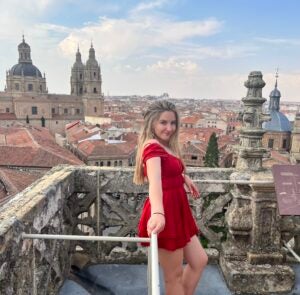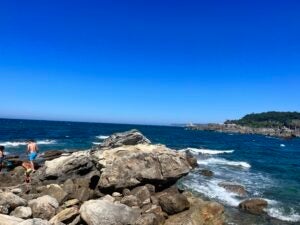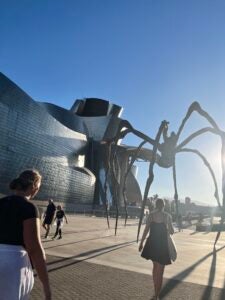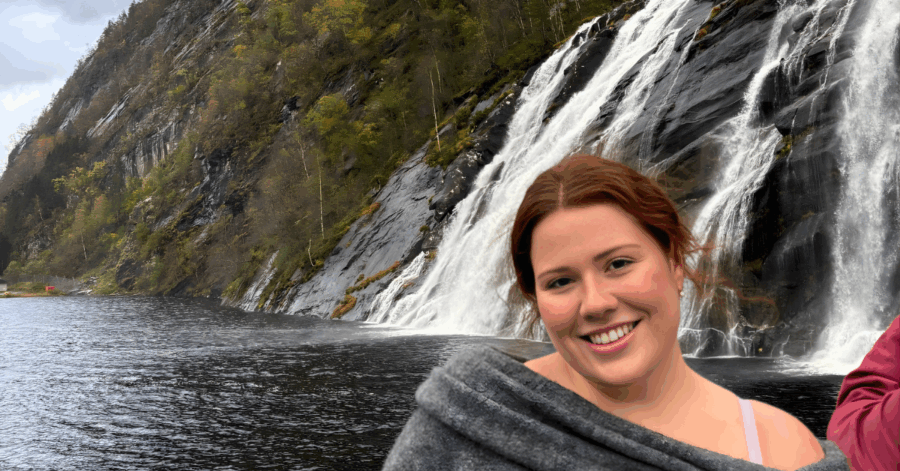
¡Hola! My name is Gillian Witten, and I’m a pre-med neuroscience major at The University of Texas at Austin, working on my certification in Spanish for the medical professions. My undergraduate thesis focuses on improving ways to facilitate culturally competent language concordance in medicine. Eventually, I hope to become a certified bilingual provider.
My main goals for my summer study abroad program in Santander, Spain, are to speak more fluently, understand different dialects and become familiar with new cultures.
Before coming to Spain, I was accustomed to what is known as the “pre-med hustle,” characterized by a laser focus on always having the correct answers, incessant studying in preparation for the dreaded MCAT, and taking hours upon hours of pure STEM classes.
In contrast, on our first day of grammar and history classes here in Santander, we were met with a welcoming environment, in which we were encouraged to participate in enriching discussions without fear of mistakes (something I was used to in my Spanish classes at UT).
I was even more taken aback by the encouragement to not spend our entire weekends and afternoons studying. Rather, we were encouraged to enjoy the beaches, spend time with our host families, and travel, as these were all described as the “real ways” we were going to truly learn the Spanish language and appreciate Spanish culture.

Not spending nights in the library?? What a concept!
The thing about immersive experiences is, you retain more than you would in a traditional classroom setting.
Once, after finishing a unit on the Spanish architecture of the Middle Ages in our history classes and a grammar unit on describing artistic elements, we went on a group excursion to León and Salamanca. There, we saw the most beautiful buildings, including the Catedral de León, the Catedral de Salamanca, and the Universidad de Salamanca.
It was a surreal experience, walking through and seeing the exquisite elements and details I had just seen in a PowerPoint in class a few days earlier. Now every time I see a work of Gothic architecture, I’m going to hear the voices of my professor and classmates shouting “¡los arcos apuntados!”

In just three weeks, my ability to communicate in Spanish has increased exponentially. I spend at least an hour talking with my host family each evening, discussing everything including the most beautiful sites to see in Europe, weird things Americans do, my friends’ interesting experiences in their homestays, to global politics.
The charades and circumlocution I’ve had to do to explain a word I don’t know has resulted in an expansion of my vocabulary I never thought possible. (You can never expect when you’ll need to know words like “screwdriver” in another language, but when you do, you’ll never forget it!)
The best feeling is when you’re at the point where you can think in another language instead of translating everything in your head. Then, at the bus station, you’re quickly humbled when you understand exactly zero percent of what was just said over the intercom.
Because it’s easy to slip back into English when you’re with your classmates, I would 100 percent recommend staying with a host family if you study abroad. Between the accountability and the family dynamic of a homestay, it’s worth it.
I remember, just before I left for my first weekend trip to Bilbao, my host mom packed me a sandwich for the road and helped me make sure I had everything for my trip. Especially since I had been feeling a little homesick, my host mom’s small gestures of support and hospitality meant so much.

Although it can be scary at times to navigate a foreign country in another language, everyone we’ve encountered in Spain has been so kind, patient, and welcoming.
Language acquisition and cultural familiarization are very different learning processes than, for example, those for organic chemistry. It has been extraordinarily special to devote this time to developing new skills and learning about art, literature, architecture and history that I wouldn’t normally get to indulge in as a STEM major.
I consider this time a crucial investment in my personal development as an aspiring medical professional. When I’m able to provide quality care to a Spanish-speaking patient without having to waste valuable time requesting a translator, it’ll be worth it.
This post was contributed by Gillian Witten, a Global Ambassador for Summer 2022. Gillian is a pre-med neuroscience major studying abroad in Santander, Spain.




